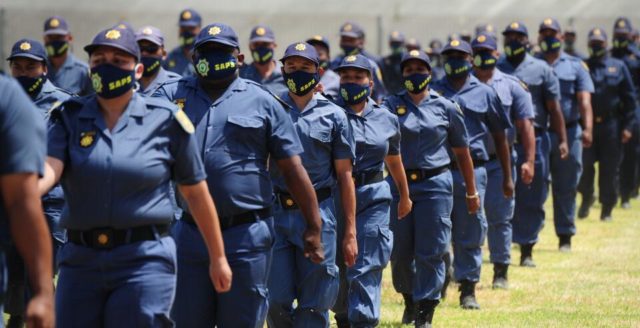The policing crisis is but one manifestation of a criminal justice system which is near to broken. If priority is not given to fixing it, the consequences for democracy will be dire, writes Mary de Haas.
OPINION: Mary de Haas
TRANSFORMING the brutal and corrupt apartheid police force into one serving democracy was never going to be easy. It could have been done, but the new government bungled it badly, which is why we still have so much corruption, inefficiency and brutality.
Strategies adopted in the 1990s, and the failure to depoliticise policing, set the scene for worse which was to follow during the “lost” Zuma years. There are currently sparks of hope of improvement, but the lack of effective oversight bodies, and the state of disarray in the criminal justice system, impede progress.
The new SAPS consisted of the old, well-trained, national SAPS force, and those from homelands, where poor standards of training and promotion beyond levels of competence were common.
Old SAP black members, regardless of experience, remained in low ranks, relative to white members of their training cohort. These members expected that their training, experience and clean records would be recognised, and their promotions fast-tracked. That did not happen, as the ANC integrated its own cadres into the police. With exceptions, it was a disastrous move, as most had no understanding of policing culture.
White SAPS (including security police) and homeland force members formed the upper echelons of management. Political interference took different forms. Some excellent black detectives were victimised because their investigations were exposing North Coast IFP and Richmond ANC warlords. Mediocrity, nepotism (and a great deal of racism) prevailed, as those in senior positions continued to dominate promotions.
By the early 2000s, many experienced members of colour had left, often suffering from work-related stress, and taking early retirement (for example, a competent black detective reporting to an apartheid security policeman).
It was known that corruption was widespread, with many members taking kickbacks from drug dealers or taxi operators, and returning guns confiscated at road-blocks to taxi bosses.
Like most other cadre integration, the appointment of the late Selebi as national commissioner was a major blunder. However, there were then still some well-trained members in management and in specific units. There was, generally, a degree of accountability, and feedback when matters were followed up.
Competence at station level varied and – as is still the case – the worst policing was usually in rural and poor urban areas, where communities lack the power to exercise proper oversight, which is also hindered by traditional leadership.
These problems paled to insignificance during the Zuma years, starting with the appointment of another politician, Bheki Cele, as national commissioner in 2009. The decision taken in 1994 to de-militarise the police was reversed, and the brutality which had simmered since 1994 became more conspicuous, as police were urged to “shoot to kill”. In 2011 the use of brutality in the training of police was exposed in the media.
For no good reason, Cele established a new unit, the Tactical Response Team, which immediately acquired a reputation for abusing and killing people. Cele was dismissed in 2012 after a board of inquiry found him dishonest, negligent and guilty of conflict of interest, and thus unfit to hold office. His scandal-racked tenure had included glaring financial irregularities and many grossly irregular appointments and promotions.
Among irregularly appointed generals were Bonang Mgwenya, who became chief operating officer, and Mammonnye Ngobeni, who became provincial commissioner in KZN. Mgwenya has recently been dismissed for tender fraud, and Ngobeni is among those facing charges for 2010 World Cup tender fraud.
The tight political control over policing continued with Cele’s successor, Riah Phiyega, and the proliferation of generals during these years left a top heavy and largely incompetent management stratum. Any semblance of accountability and feedback disappeared.
Another particularly dangerous legacy is the political capture of Crime Intelligence, including through the infiltration of sinister operatives trained in overseas countries.
The challenges faced by the well-qualified, experienced General Sitole, who was appointed national commissioner in 2017, should not be underestimated. Incompetent people in management present a major impediment to improving bureaucratic functioning and his attempts to demote generals have been unsuccessful. There have been dismissals, and convictions, including of those who looted intelligence funds. Policing needs good intelligence, which it is not getting.
Sitole’s reshuffling attempts have provoked a backlash from the minister. Continuing political interference poses a major threat to Sitole and his work.
Oversight bodies – national and provincial civilian secretariats and, especially, the Independent Police Investigative Directorate (Ipid) – have failed badly and must share the blame for the policing mess.
Legislation to give Ipid independence from the Ministry of Police, as decreed by the Concourt is urgent. Prosecution services are supposed to guide detectives but have dropped the ball, They too bear responsibility for poor quality investigations and allowing cases lacking evidence to proceed (including politically-driven ones).
The policing crisis is but one manifestation of a criminal justice system which is near to broken. If priority is not given to fixing it, the consequences for democracy will be dire.
* Mary de Haas is an honorary research fellow at the University of KwaZulu-Natal’s School of Law and a member of the Navi Pillay Research Group focusing on justice and human rights.
** The views expressed here are not necessarily those of the DFA.








